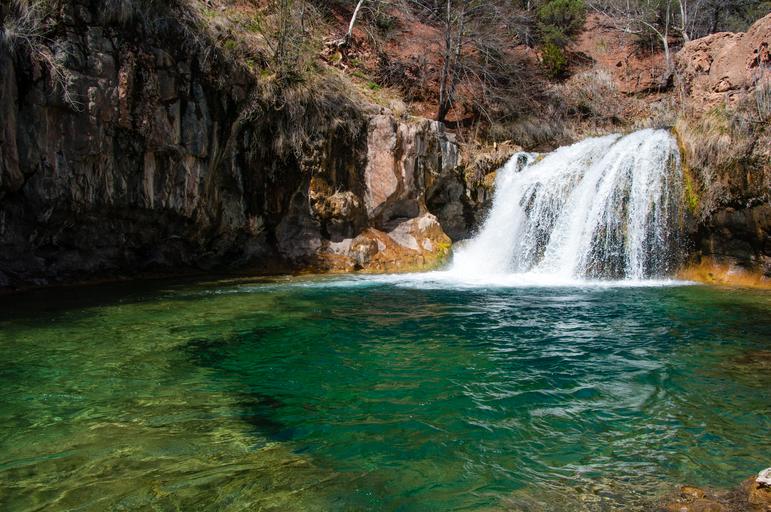MAKE A MEME
View Large Image

| View Original: | Waterfall_Trail_at_Fossil_Creek.jpg (4494x2986) | |||
| Download: | Original | Medium | Small | Thumb |
| Courtesy of: | www.flickr.com | More Like This | ||
| Keywords: arizona coconino national forest coconinonationalforest forest service forestservice fossil creek fossilcreek red rock ranger district redrockrangerdistrict tonto national forest tontonationalforest usfs canyon creek forest outdoors riparian water camp verde campverde united states unitedstates landscape waterfall outdoor watercourse This large, natural waterfall on Fossil Creek is the destination of hikers on Waterfall Trail. A large, deep pool at the base of the fall is a popular swimming hole. Fossil Creek seems to appear out of nowhere, gushing 20,000 gallons a minute out of a series of springs at the bottom of a 1,600 foot deep canyon. Over the years these calcium laden waters have laid down huge deposits of a type of limestone called travertine. That rock-like substance encases whatever happens to fall into the streambed, forming the fossils for which the area is named. Fossil Creek is one of two "Wild and Scenic" rivers in Arizona. This special designation was achieved when the Irving power plant was decommissioned, and removal of flume and dam on the creek allowed this magnificent creek to once again flow freely through Arizona's arid landscape. Most people come to Fossil Creek to sunbathe, wade, hike and birdwatch. It's also a great place to take photographs. The lushness of the riparian area strikes a sharp contrast to the brittle desert that surrounds it. Increasing popularity has led to the Coconino and Tonto National Forests to implement a parking permit reservation system in 2016. Reserved parking permits give visitors the peace of mind knowing they'll have a spot waiting for them in this remote location. Many visitors drive two or three hours to get to the creek. The final descent to the creek at the bottom of a canyon is on an extremely rough, rocky jeep road. Photo by Deborah Lee Soltesz, March 2, 2016. Credit: USFS Coconino National Forest. Learn more about visiting Fossil Creek, Fossil Springs Wilderness, and the Coconino National Forest. This large, natural waterfall on Fossil Creek is the destination of hikers on Waterfall Trail. A large, deep pool at the base of the fall is a popular swimming hole. Fossil Creek seems to appear out of nowhere, gushing 20,000 gallons a minute out of a series of springs at the bottom of a 1,600 foot deep canyon. Over the years these calcium laden waters have laid down huge deposits of a type of limestone called travertine. That rock-like substance encases whatever happens to fall into the streambed, forming the fossils for which the area is named. Fossil Creek is one of two "Wild and Scenic" rivers in Arizona. This special designation was achieved when the Irving power plant was decommissioned, and removal of flume and dam on the creek allowed this magnificent creek to once again flow freely through Arizona's arid landscape. Most people come to Fossil Creek to sunbathe, wade, hike and birdwatch. It's also a great place to take photographs. The lushness of the riparian area strikes a sharp contrast to the brittle desert that surrounds it. Increasing popularity has led to the Coconino and Tonto National Forests to implement a parking permit reservation system in 2016. Reserved parking permits give visitors the peace of mind knowing they'll have a spot waiting for them in this remote location. Many visitors drive two or three hours to get to the creek. The final descent to the creek at the bottom of a canyon is on an extremely rough, rocky jeep road. Photo by Deborah Lee Soltesz, March 2, 2016. Credit: USFS Coconino National Forest. Learn more about visiting Fossil Creek, Fossil Springs Wilderness, and the Coconino National Forest. | ||||